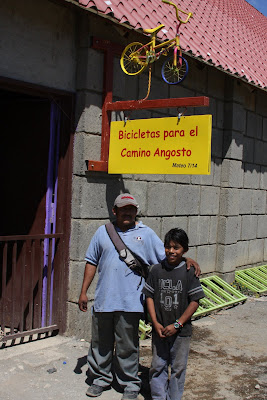
I just got back from a trip to Nicaragua. I went with my boyfriend's family and their church. At first I was a little unsure of whether or not I wanted to go because I know sometimes good people within the church have sticky motives and they set up programs where they'll give people food or medical care only if they'll listen to some speech about Jesus. I don't like stuff like that. It creeps me out and I think it's wrong. Needless to say, I was a little worried going on the trip because I was afraid I would be helping out an organization that did that. After studying international development, I get a queazy feeling about the word "missionary" or "mission trip"-but, I talked to a lot of people who I trust and who know me and everyone thought that I should go...so I did. Last year I worked at a church and we took a group of our youth to Quito for 2 weeks. It was an incredible experience and it felt so worthwhile because I cared so much about the kids we took and it was awesome to see their eyes being opened to the way that the majority of the world worked. This trip, was a lot different. Firstly, it was a team made up of all adults- there were 25 people and the oldest couple had been MARRIED for 64 years- Matt and I were on the younger side (him more so than me obviously). We went to a compound that was once owned by the dictator Anastasio Somoza Debayle. Larry and Donna Wright bought the compound 6 years ago and now use it as a sort of base camp for all the work they do. Currently they feed over 19,000 people a day and have opened schools all over the country. Donna also sponsors a dorm at a women's prison and provides them with basic necessities. They employ a lot of Nicaraguans and basically do a lot of good work.
There were a few things that really surprised me this week. Firstly, it was really neat to see how much work a group of Canadians could actually get done. We put a new roof on the compound- a huge job. Three of the guys on the team worked in construction and were very skilled. They did all of the technical work, along with a group of Nicaraguans, and the rest of us hulled panels and did what they told us to do. One other cool thing was that after the old roof was ripped off (parts of it were leaking) all of the panels were puts out on the road for the neighbours to take. Apparently each panel was worth a days wage. Some people loaded carts pulled by horses all day with the free panels.


Another team member was skilled at doing dry wall- he taught a group of us how to use "mud" (the white plaster stuff) to even out dry wall panels and how to make the seams invisible. Finally, John, the team leader, had loads of business and engineering skills and helped to design the way that we put in the play ground. We accomplished a lot of tangible things. The medical clinic is almost finished- and people will undoubtedly benefit from that. Here are a few pictures from our playground installation adventures.
Who knew that dirty buckets would be perfect for holding concrete. It was super hot out- while we were digging the holes for the equipment we found over 50 bullet casings. Apparently one of the walls of the playground had been used as the backdrop for executions- there were AK47 shells and 9 millimeters.

I got to lead a "tour" of the playground for some of the team members who were assigned to other tasks- to our surprise there were already kids playing. It was a really beautiful moment and most definitely made all of the digging and labouring in the sun more than worth it.

Here is my favourite shot. I love the idea that something so ugly, so dark as an execution area, with lingering evidence of the atrocities committed and the lives lost, can now be a place of joy, laughter and life.

Finally, last year when Matt was in Nicaragua with his family they opened a bike shop out of the compound- it's a pretty cool idea because the bike shop is fully functional and runs all year long by this great guy named Antonio. Old bikes from Canada are sent to Nicaragua and Antonio fixes them up and sells them. Each bike costs about 450 Cordoba or $22 USD. This bike shop not only provides transportation for the locals (almost no one has cars as a tank of gas costs the same as here, but the average worker makes about $5 American per day) but also is a job for Antonio and Domingo, a young guy who works part time. I like the bike shop because it is sustainable and practical for the people there. Bikes allow people to get to their jobs and to get around. The bike shop looks even better than when Matt left it last year- this year a new sign got put up.


I have so much more to write about this trip and I want to a little bit about how I dealt (or didn't deal) with the tension of "missionary" work and how it feels to be white and rich...because there were times that I had to look away from the tiny sad eyes of little children-it was the first time in my entire life that I have ever felt devoid of any humanness. I have never felt shamed of the colour of my skin- but a few times on this trip, I felt sick, like I was some sort of freak show and that everyone was staring at me. But- I'll write more about that later.


No comments:
Post a Comment